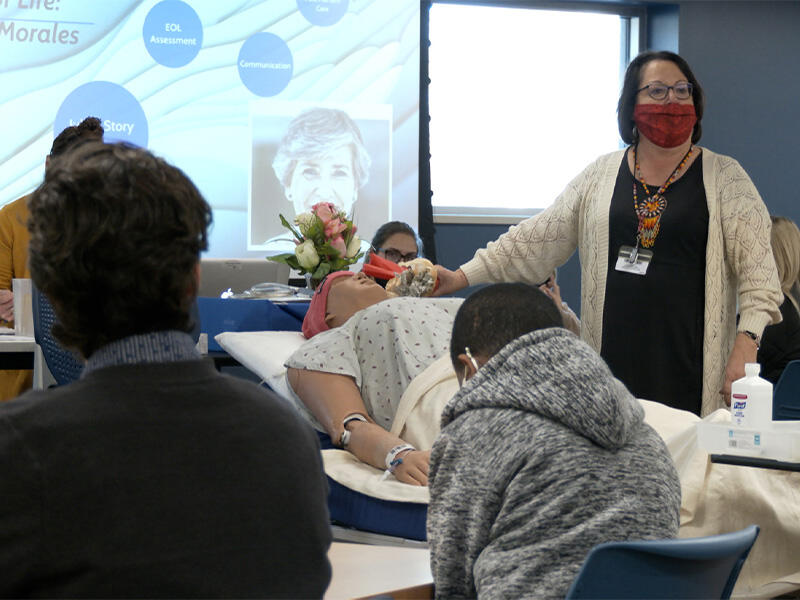With a tagline like “Here for all. Here for good,” it’s easy to see Sanford Health takes the utmost pride in providing care for every patient.
Look at those words again. Every. Patient.
Here’s another way of putting it: providing equitable health care.
Offering care to everyone
Karla Abbott, DNP, RN, is an associate professor of nursing at Augustana University. She also serves on Sanford Health‘s ethics committee.
She described equitable health care as providing top notch care to “everybody, no matter their income or their status in society.”
“Equitable means that no matter where you go to, whether it’s the emergency room or you’re being admitted for a surgery, that patient can be rest assured that their care is going to be top notch, not because of who they are, but because we give that care to everybody,” she explained.
Improving health care access: Native American Community Outreach at Sanford Health
She plays her part in offering this care to one community in particular: Native Americans.
Dr. Abbott is Native American herself, and proud of it. There are nine reservations in South Dakota, each needing access to quality health care.
“It’s so important because Native Americans are huge consumers of our health care dollars across the nation. So we have a lot of health disparities, diabetes, hypertension, cardiovascular disease, and cancer, and other diseases, even traumas. And we know that we have these diseases at a disproportionate rate compared to others,” she said.
Breaking down barriers
Along with easier access, Dr. Abbott said Native American communities need providers who understand their culture.
It’s part of the reason she holds a prominent seat at the table of the Sanford Health ethics committee.
“Being a Native American nurse and a Native American community member, I’m able to provide insight on maybe why a Native American family coming to Sanford for health care is asking for certain things or acting a particular way. I can provide insight into the values they have.
“We know that because of colonization, there’s been a little bit of mistrust among the Native American patients and their families and health systems all across the United States. So, I really think that the ethics committee is doing its due diligence in trying to break down those barriers,” she explained.
Related: Dialogue, education can break down Native barriers to care
A large component of breaking said barriers is proper education. By preparing the future workforce of health care providers, Dr. Abbott is doing this at Augustana.
“I think what’s important is that we prepare health care providers so that they can give a good standard of care to these patients, along with some understanding of where these patients come from, what path have they walked to get to our facilities,” she said.
Starting with small steps
Dr. Abbott said she thinks Native American families and patients are seeing more support at Sanford Health.
“One of them might be as simple as a social worker bringing a bundle of sage to lay at the patient bedside. We know in our Native American spirituality sage, and the burning of sage, offers up prayers for healing. We can’t burn sage in the hospital for obvious reasons, but there are certain procedures that have been tweaked so we can have that feeling of spirituality.
“For instance, at the facilities here in Sioux Falls, they will burn sage outside and extinguish and say a prayer outside. Then, bring the sage at the bedside once it’s done (burning). Those little touches are real important,” said Dr. Abbott.
But, she said, there’s “always” going to be work to do in regards to culturally competent care.
“That’s what I love about it. It provides the challenge to everybody to learn as much as they can and to work with different cultures as much as they can. Really to be sure they’re on the same level. We don’t want our patients from different cultural backgrounds feeling like they’re less than. We want them to feel equal,” she said.
Continuing education
Natasha Smith is the head of health equity and experience at Sanford Health. She said through resources like the biomedical ethics committee, Sanford Health is always working to best educate providers on how to support every patient, no matter their background.
“This committee really acts as an educational resource for our providers, our clinic staff, patients, and the broader community. They make recommendations to the medical center administration on policies or organizational ethic issues as requested.
“They’re a really fantastic resource for our organization,” she said.
Smith praised Dr. Abbott for the work she’s doing to make Sanford Health an example of culturally competent care.
“She uses both her expertise as a medical professional and education, and her insight into the Native American life and her health beliefs, to inform dialogue. Karla’s background as a nurse brings a unique patient care dimension to the committee discussions.
“Certainly, her heritage as a member of the Lakota Nation will bring that voice to the table to shed light on cultural underpinnings then can cause deep mistrust and misunderstandings in health care settings,” she said.
Smith said special months celebrating different cultures are great to raise awareness, but the real work happens when the month ends.
“I think it’s important to know Sanford’s commitment permeates the entire year. It’s not about one month. It’s about the entire year and working hard for these communities. Here at Sanford Health, no matter where you come from, no matter your heritage or background, no matter who you are, you’re going to be able to come to our organization and seek really exceptional care.”
Learn more
- Outgoing Society CEO supports Lakota Nation scholarships
- Health advocate provides comfort, trust for Native patients
- Sanford Health supports, celebrates Native American cultures
…
Posted In Community, Here for all. Here for good., Leadership in Health Care, People & Culture

